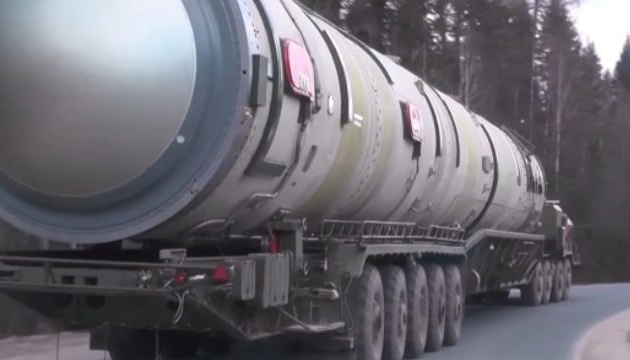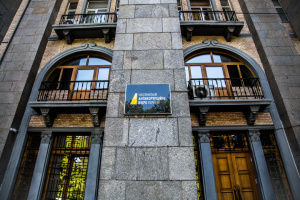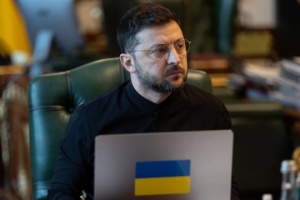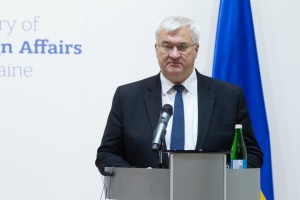
Nuclear weapons, Sarmat missiles, and escalation of war: How Kremlin propaganda blackmails European countries
In his video address on September 21, Russian President Vladimir Putin not only announced the beginning of “partial mobilization,” but also accused the West of alleged “nuclear blackmail” against Russia, threatening retaliatory actions and adding that “this is not a bluff!”. So, who is blackmailing whom? The Centre for Strategic Communication and Information Security explains this through the example of narratives that were discovered during the Ukraine War Disinfo Working Group’s monitoring of pro-Kremlin channels in 11 European countries in the period from June 20 to September 25. The sample of countries included Bulgaria, the Czech Republic, Estonia, Georgia, Hungary, Latvia, Lithuania, North Macedonia, Poland, Slovakia, and Ukraine.
It should be noted that Russia is not only trying to blackmail the West with empty words: the actions of Russian occupiers at the Zaporizhia NPP can yield dangerous implications of a global scale.
How Russia intimidates Europe
Messages on the use of nuclear weapons can also be heard in the context of Russia being forced to use nuclear weapons if it loses. Russian propagandists have repeated similar messages in this regard. For example, back in April, on the air of the “Evening with Vladimir Solovyov” programme, propagandist Margarita Simonyan stated that “the most obvious solution to this war is a nuclear strike.”
Also in April, the Russian MoD reported on the “successful pilot launch” of a new intercontinental ballistic missile Sarmat, and now, Kremlin propagandists are trying to scare Europeans with the narrative that Putin will wipe Europe off the face of the earth using Sarmat.
🇷🇺Today at 15:12 Moscow time, Sarmat, land-based intercontinental ballistic missile, was successfully launched from a silo at the Plesetsk state testing cosmodrome in Arkhangelsk Region. pic.twitter.com/xLsAUIDdIX
— Минобороны России (@mod_russia) April 20, 2022
According to the Russian president, “this missile will make those who are trying to threaten Russia think twice.” However, he did not specify who exactly was trying to threaten Russia.
In fact, neither the USA, nor the EU, nor NATO have ever threatened Russia with nuclear weapons. In addition, on June 23, 2022, 65 countries that had ratified the Treaty on the Prohibition of Nuclear Weapons adopted a joint declaration in Vienna condemning Russia’s nuclear threats.
NATO officially considers Russia to be the most significant and direct threat to the security of the member states of the Alliance and peace and stability in the Euro-Atlantic region. This was included in the updated strategic concept approved by NATO at the Madrid summit on June 29, 2022.
The Russian Federation is modernizing its nuclear forces and expanding its novel and disruptive dual-capable delivery systems, while employing coercive nuclear signaling. It aims to destabilize countries to our East and South,” believes the Alliance.
Who is targeted by Russian propaganda
In narratives directly naming Russia’s next target, the European countries mentioned were Poland and Lithuania. According to propaganda messages in 11 European countries, they are allegedly meant to be Russia’s next targets. Occasionally, Russia also threatens an attack on “NATO countries.”
Poland has already received multiple threats like that following Russia’s full-scale invasion ofUkraine. For example, back in May, the Chairman of the State Duma Committee on Control, Oleg Morozov, said that “the Polish authorities, with their statements, are forcing Russia to put Poland ‘in line for denazification.’”
How Kremlin’s propaganda tries to pit European countries against each other
According to Russian propagandists and their messages on local channels of European countries, Lithuania, Poland, the EU, the USA, and Ukraine “protract the war and lead to its escalation.” For example, the aggravation of the narrative about the “escalation of the war by Lithuania” is observed in the context of the blockage of transit to Kaliningrad through Lithuania.
Russia also sometimes spreads messages depicting Ukraine as “a dangerous enemy of Europe.” For example, “Ukraine will attack the EU after winning the war with Russia.” This narrative was found in Hungary, with a call not to arm Ukraine.
At the same time, Russia is constructing an image of the EU as “an organization that cannot be trusted,” since, according to propagandist channels in 11 European countries, “the West will sacrifice Eastern Europe if the war reaches it” or “the West will fall.”
At the same time, for “a big picture,” the Kremlin’s propaganda comes up with pretend threats and blackmail on the part of Western countries. For example, “The West will use nuclear weapons against Russia,” “Georgia will have a second front against Russia,” and “The West wants Ukraine to occupy Russia.”
Ukraine’s experience in the information war against Russia shows that Kremlin propaganda uses such messages only to justify its illegal policy and as preparation for the implementation of dangerous plans. Only joint coordinated actions and the unification of international partners in opposing Russia’s illegal actions will be able to stop the aggressor.
Center for Strategic Communication and Information Security




